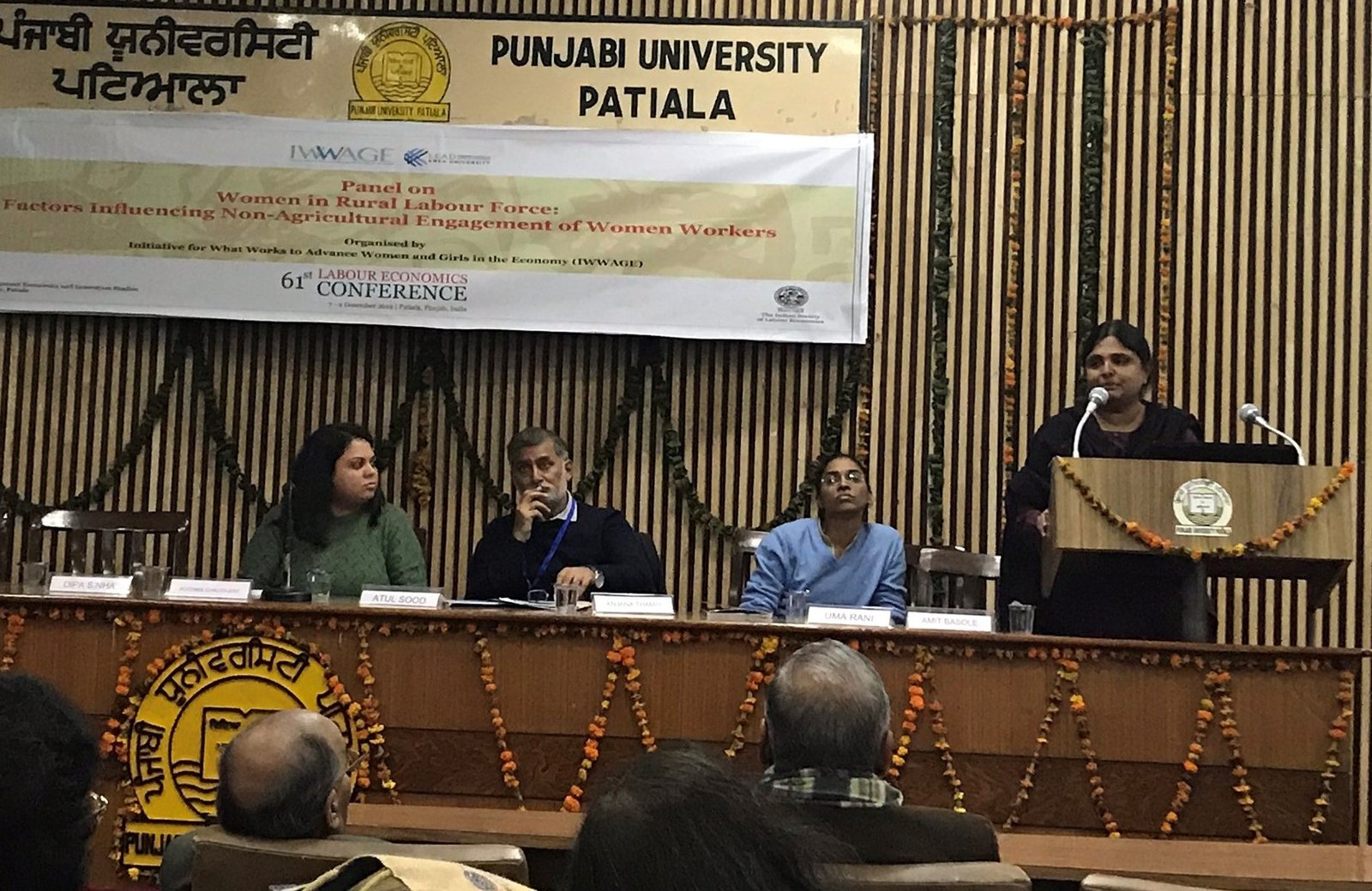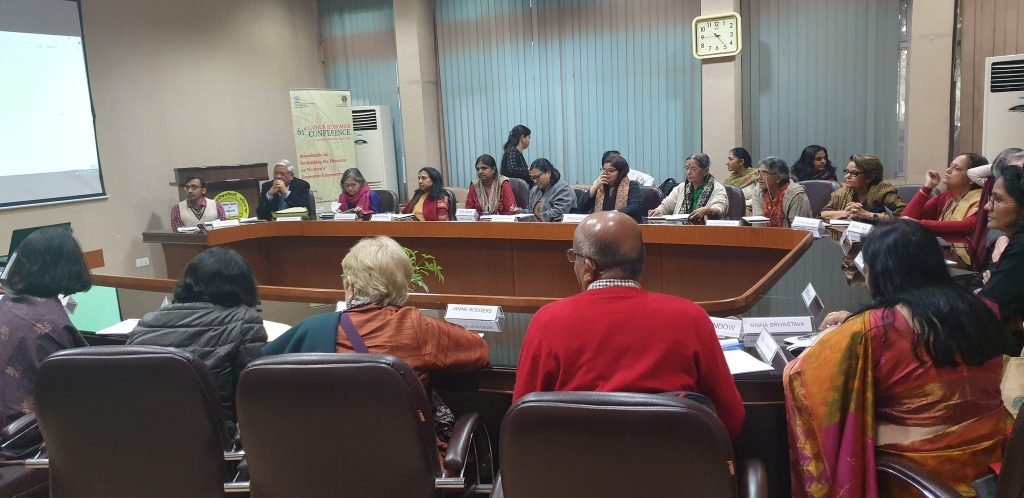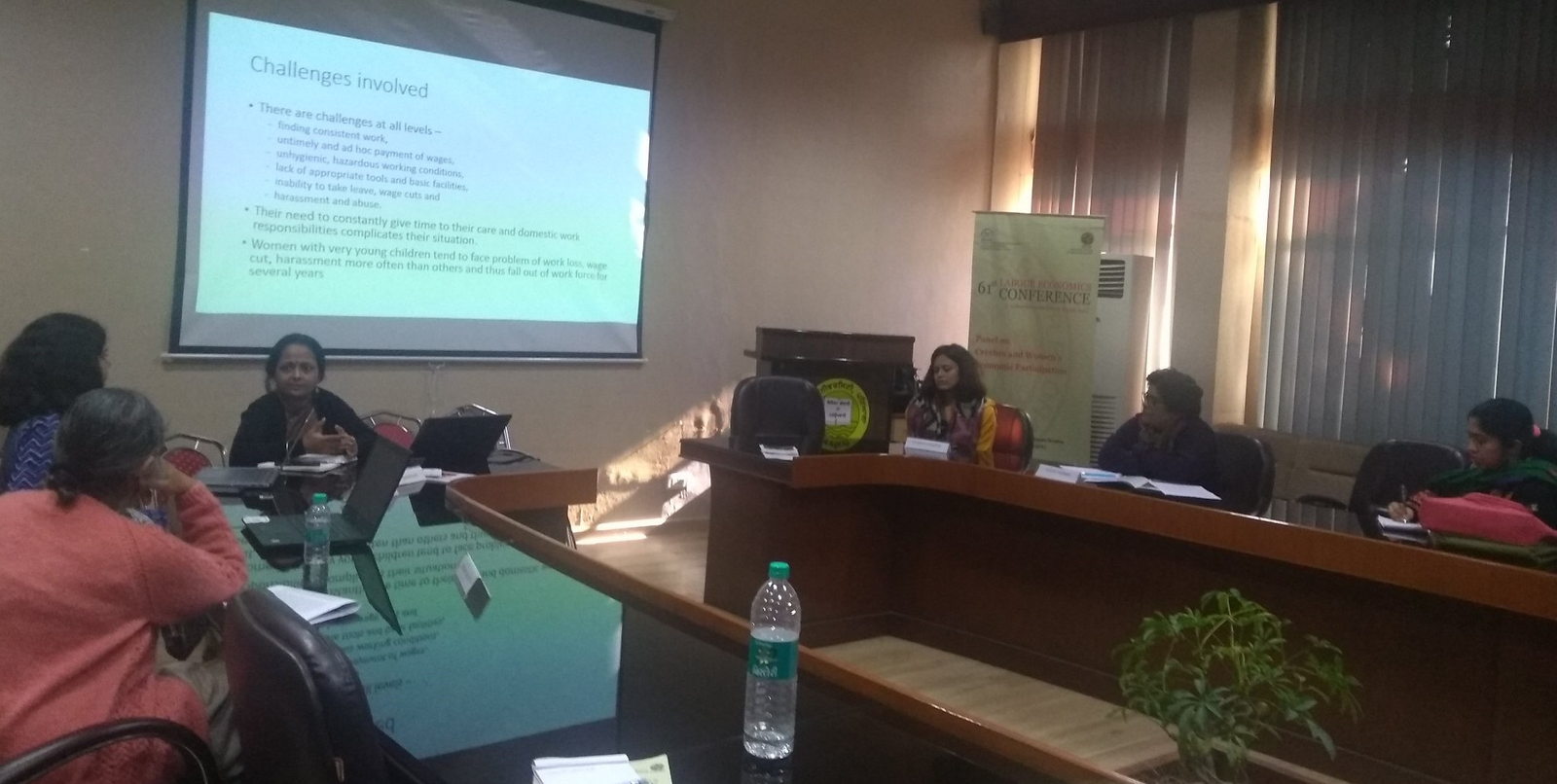Empowering Women in the Economy: Addressing Gaps and Rethinking the Discourse

More women joined the labour force globally in the last three decades. India, however, is an anomaly, with historically among the lowest and even declining rates of female labour force participation – share of women in total employment was 32.9 percent in 1993-94, which reduced to 23.3 percent in 2017-18. This is puzzling for an economy that has experienced a fertility transition, increases in women’s educational attainment and a steadily increasing rate of growth of GDP in the last one and half decades till about 2012. The concerns around low female labour force participation have generated a rich discourse in India on women’s work.
With the aim of contributing to the existing debates around low female labour force participation, and findings possible solutions for reversing such trends, the Initiative for What Works to Advance Women and Girls in the Economy (IWWAGE), organised two panels and a roundtable at the ISLE Annual Conference, held in Patiala, from 7-9 December, 2019. The panels organised in collaboration with Centre for Gender Studies at IHD and the Bill & Melinda Gates Foundation, focused on the importance of childcare and engaging women in the non-farm sector, while the roundtable brought together eminent feminist and labor economists from around the country, to deliberate on the future discourse on women’s economic empowerment.
The first panel titled The Importance of Crèches for Women’s Economic Empowerment discussed the importance of childcare and its implications on women’s productive engagement in the economy. Childcare is often identified as one of the major constraints that keeps women from joining the labour force. The discussion in the panel focused on the significance of full-day crèches for providing childcare and freeing up women’s time to participate in the labour market. The panellists included Monika Banerjee (Institute of Social Studies Trust), Anoushaka Chandrashekar (LEAD at Krea University) and Sudeshna Sengupta (Independent Researcher). Kanika Kingra from IWWAGE moderated the session and Susan Thomas from SEWA put across her perspectives on the issue as a discussant.
The panellists noted that most women struggle to balance paid and unpaid work responsibilities, and as a result resort to strategies like taking up flexible work, part time jobs, and opting for work near or inside their homes. Further, patriarchal notions of “what women should do” limit women’s access to educational and skilling opportunities, job prospects, agency and mobility. As a result, most women end up working in the informal sector, without dignity, social security and without decent and timely wages. The panel was in consensus about the role of crèches in impacting women’s workforce participation and income positively and in contributing to empowering women. The positive impacts of crèches are not limited to just women but are also extended to children’s health and educational attainments. Therefore, providing quality crèches is an important right for both women workers and children. It was concluded that childcare must be a public good and its provision should be ensured by the state with the help of community participation and private provisioning.

The second panel titled Women in Rural Labour Force: Factors Influencing Non-Agricultural Engagement of Women Workers discussed several aspects of what might work to reverse the decline in women’s economic engagement. Labour force statistics in India clearly show that rural women’s work participation rates are declining and this decline is led by the agricultural sector – rural female labour force participation rate declined by 7 percentage points between 2011-12 and 2017-18 and there is a decline of 23 percentage points in the share of rural women workers in agriculture in the last ten years. Further, rural women remain outside the labour force due to the lack of adequate opportunities in the non-agricultural sector. The panellists highlighted that several factors such as importance of education, skill and training, role of social identities and the use of technology and macroeconomic factors influence economic opportunities for women in the non-farm sector. The panellists included Atul Sood (Jawaharlal Nehru University), Anjana Thampi (IWWAGE), Dipa Sinha (Ambedkar University Delhi), Nitya Nangalia (SEWA Bharat) and Ruchika Chaudhary (IWWAGE).
The panel began with the importance of having in place, a holistic strategy for labour market progress in tandem with the growth of the economy. It was noted that non-farm employment of women needs to be prioritised. One of the panellists revealed large number of women involved in the health and education sector. The preference for such sectoral jobs is mostly due to the availability of such jobs within the purview of public employment in rural areas. These jobs are preferred as they provide regularity of wages, but are too few in number. The panellists further discussed how belonging to a social group, either caste-based or religious, impacts women’s economic participation. It was noted that there has been a decline in female labour force participation in both rural and urban areas, across all social groups, but the gaps are more pronounced for the scheduled castes. One of the panellists presented the status of women working in emerging platform-based gig work in beauty and salon services. Women prefer gig work due to the flexibility of working hours that allows them to balance work better with their unpaid domestic responsibilities and exert an autonomy over the use of their time. The SEWA presentation highlighted successful stories of SEWA initiatives on skilling women in non-traditional occupations and ensuring non-farm livelihood opportunities for women. It provided a series of learnings on initiatives for self-employment of women in rural areas. The session was moderated by Sona Mitra from IWWAGE and key perspectives were offered by two discussants, Uma Rani (ILO) and Amit Basole (Azim Premji University).

Finally, IWWAGE in partnership with Bill and Melinda Gates Foundation (BMGF) and the Centre for Gender Studies at the IHD organised a successful Roundtable on Rethinking the Discourse on Women’s Economic Empowerment, moderated by Yamini Atmavilas (BMGF) and Ritu Dewan (ISLE, IAWS). The roundtable was contextualised in the backdrop of the global discourse around women’s economic empowerment to include discussions on the future of work, expanding the definition of work to include women’s unpaid work responsibilities and the resolution on violence and work that goes beyond sexual harassment. More than 20 eminent feminist and labour economists deliberated the issue of declining female labour force participation in India and discussed what could be done to shape a research and policy agenda.
At the very onset, it was acknowledged that women’s economic empowerment is a dynamic concept and academia, advocacy and action are its three pillars. From the discussion that followed, it clearly emerged that women’s economic empowerment needs to be understood beyond conventional labour markets, employment and care variables. In terms of research, focus should be to discuss the low levels of empowerment in particular economic, political and social environments; to explore state-wise diversity; to examine links between violence, property rights and access to common property resources; and to understand structures of patriarchy with link between paid and unpaid work. Further, the consideration of intersectionalities – that of caste, class, age and others – is vital to sharpen understanding on which groups of women are more disempowered. Aspirations of women, too, differ among the younger and older generations and this differential needs to be accounted for. Short term solutions to advance women’s empowerment may include increased representation in decision making bodies such as Gram Sabhas that could affect decent work opportunities for women, ownership of property by women, creating safe spaces for women to empower them psychologically and emotionally, etc. But in the long term, efforts would be needed to shake up the system and change the balance of power – specially to overturn patriarchal, social and behavioural norms.
The blog has been written by Hiya Singh Rajput, Research Assistant at IWWAGE, and draws from the reports of the roundtable and panel discussions prepared by the rapporteurs at the ISLE conference.
- Posted In:
- Latest Blogs






















































Leave a Reply